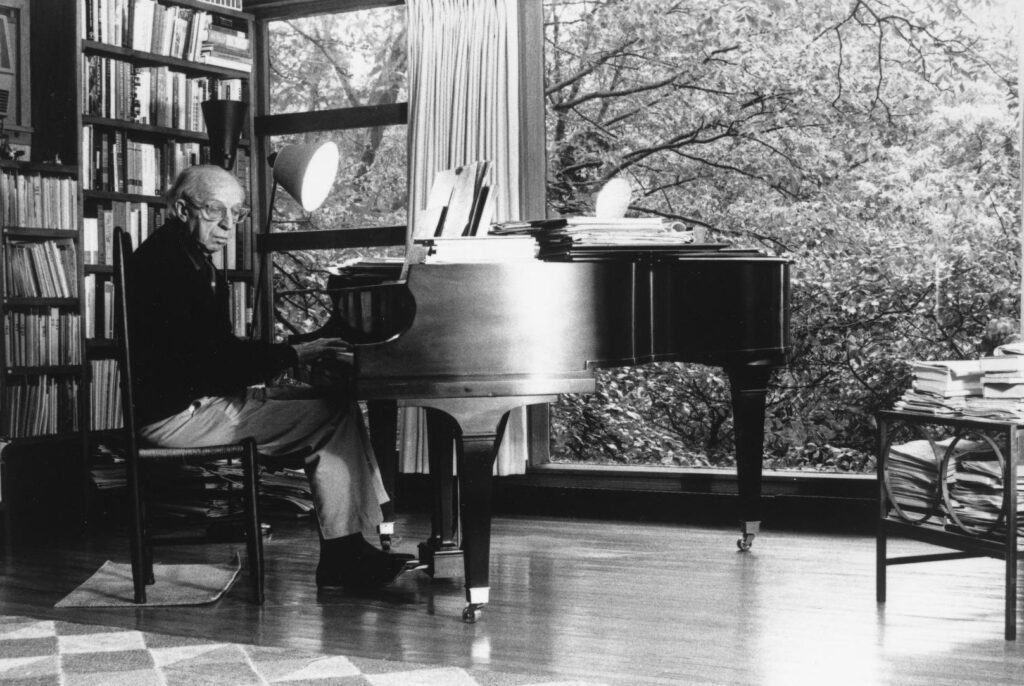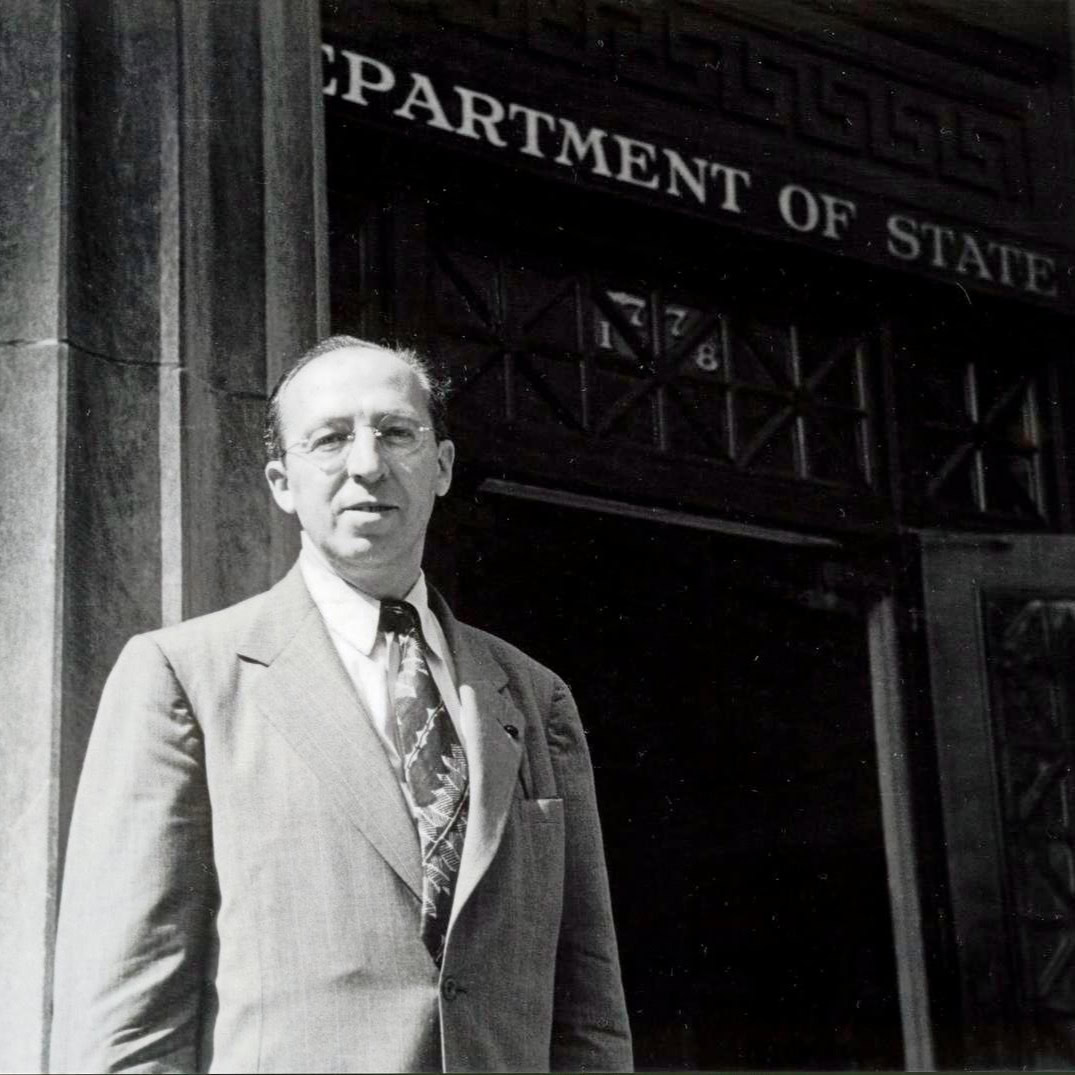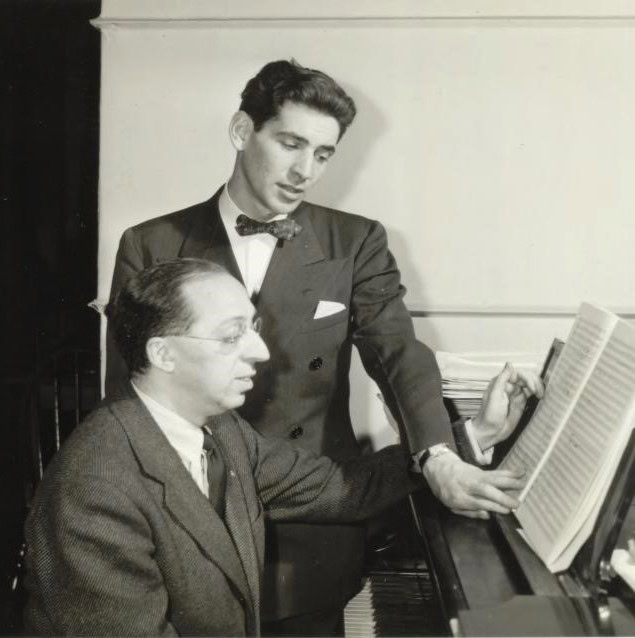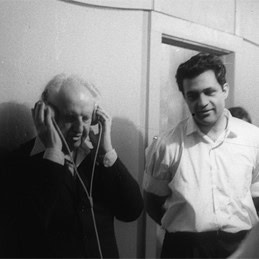
Aaron Copland, hailed as the “Dean of American Composers,” crafted America’s musical identity in the 20th-century. Born in 1900 and active through much of the century, Copland lived in a transformative era in American history—one in which the nation was asserting a bold new image of cultural strength and global engagement. Copland’s music captured the American spirit, blending folk traditions, jazz idioms, and the vastness of the frontier into a unique sound which came to define American classical music. Copland received Fulbright awards to Italy and Germany in the 1950s and 1960s where he performed and lectured, and introduced audiences to the heights of American artistic achievement during a time of culture renewal in the wake of World War II.
His most iconic compositions—Appalachian Spring, Billy the Kid, Rodeo, Lincoln Portrait, and Fanfare for the Common Man—captured the essence of American culture. These works continue to resonate with audiences worldwide.
Copland believed that music should speak directly to its audience. His Pulitzer Prize-winning Appalachian Spring, composed for a ballet choreographed by Martha Graham, exemplified this ethos. He described the score as “plain, singing, comparatively uncomplicated and slightly folksy”—a deliberate effort to deliver high-brow art for everyday people.
One of his most popular and frequently performed works, Fanfare for the Common Man, became a patriotic anthem. It was commissioned by the Cincinnati Symphony Orchestra in 1942, shortly after the United States entered World War II, to inspire audiences and pay tribute to the war effort. It was subsequently incorporated into his Third Symphony, commissioned by the Boston Symphony Orchestra and performed nationwide, including by the New York Philharmonic under famed American conductor Leonard Bernstein.
Fanfare has been used to evoke a sense of national pride at presidential inaugurations, to add notes of drama and triumph to sporting events like the Olympics, and to give solemnity to occasions such as the dedication of the 9/11 Memorial. It also served as wake-up music for NASA shuttle crews and featured in a U.S. Navy recruitment commercial. The Kennedy Center observes that Fanfare “still stirs the hearts of Americans today—whether they recognize it by name, or just by its soaring notes.”
Copland’s influence extended to film, where his scores deepened the emotional resonance of quintessential American stories. He received Academy Award nominations for his scores for Of Mice and Men (1940), Our Town (1941), and The North Star (1944), and won the Oscar for his score of The Heiress (1950). The American Film Institute inducted Copland’s score for John Steinbeck’s The Red Pony into its hall of fame, as part of its recognition of “100 Years of Film Scores.”



In addition to his composition work, Copland served as a musical envoy, representing American values abroad through education and exchange. Copland toured Latin America under the auspices of the U.S. State Department’s Office for the Coordination of Commercial and Cultural Relations between the American Republics. He championed American music and composers through concerts, lectures, and outreach to rural communities, as part of the Good Neighbor policy, which emphasized cooperation and trade in the Western Hemisphere. Fulbright awards to Italy in 1951 and to Germany in 1963 further emphasized the power of music in American diplomacy. In Rome, he lectured and composed at the American Academy and conducted a fellow Fulbrighter’s work—Rounds for String Orchestra by David Diamond. During his Fulbright, Copland also traveled to Israel, delivering a lecture on Jewish composers and affirming his belief that a composer could maintain a strong national identity while embracing his Jewish heritage.
Aaron Copland was a composer and a conductor who represented the highest level of American cultural achievement at home and abroad. Through his Fulbright experiences and State Department tours, he carried America’s spirit across borders, with a sound that embodied the nation’s values and showcased its musical innovation.
In 1964, Aaron Copland was presented with the Presidential Medal of Freedom for his contributions. The citation read, “Masterful composer and gifted teacher, his music echoes our American experience and speaks expressively to an international audience.” In 1979, he was recognized as part of the second-ever Kennedy Center Honors. Following his death in 1990, the popularity of Copland’s music continued undiminished. In 2025, the 125th anniversary of Copland’s birth was marked by performances of his music across the world—introducing new audiences to the spirit of American music.

Fulbright is commemorating the 250th anniversary of the Declaration of Independence with stories of distinguished Fulbrighters who have showcased American excellence, innovation, and culture around the world. For 80 years, Fulbright has set the benchmark for global excellence and leadership in science, innovation, education, and culture.